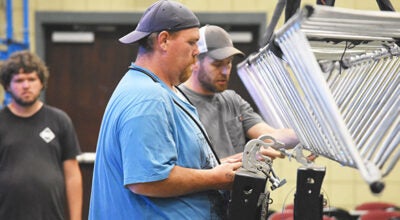Vicksburg officials OK $30.2M spending plan
Published 12:00 am Wednesday, September 13, 2000
In what Mayor Robert Walker called the first step toward independence from gambling taxes, Vicksburg officials Tuesday approved a $30.2 million spending package for the next 12 months.
The fiscal 2001 budget is about $1 million more than budgeted last fall for 2000, but far below the $35.1 million that the budget reached after a rash of amendments in February.
The vote was 2-1, with South Ward Alderman Sam Habeeb defecting and citing what he considers inflated personnel budgets and reliance on casino revenues. Habeeb has voted against every proposed budget since he was elected in 1997.
The $30.2 million includes almost $7 million in a separate fund for capital improvements. Projects budgeted with that money include a Jackson Street youth center, repaving an uneven road surface on North Washington Street and recurring street maintenance costs.
The budget also includes $600,000 set aside for merit raises for city employees, although how much of a raise employees might see has not been determined.
Walker called the budget a “major accomplishment” because the general fund uses no cash reserves and tax rates will stay the same, at 35.88 mills.
“Finally, we have a budget that is within our tax collections,” he said. “A major goal has been accomplished here.”
The next step is to start setting aside casino revenues for capital improvements, instead of using that money for operating expenses, he said.
“In time, we’ll be able to take all of these gaming funds and put them into one-time expenditures,” Walker said.
The new budget saves $124,000 by eliminating about 20 positions from the payroll, but that figure does not include the money allocated for raises.
The savings represents a drop from $16,384,600 in payroll to $16,260,337. Employees’ paychecks still account for more than half the city’s budget.
Habeeb takes issue with the claim that no cash reserves are used in the budget.
The $7 million cash reserve budget is funded almost entirely with leftover funds from the current year’s budget and money allocated to projects that did not come through in fiscal 2000.
For instance, the Clay Street improvements have been held up because of delays in getting easements, and the Jackson Street youth center, budgeted for $1.9 million last year, never happened because bids came back three times over budget.
Habeeb also said that the city’s accounting office originally estimated revenue for next year at $22.4 million, but revised that figure to $23.2 million to comply with the mayor’s request that spending be “within revenues.”
“Changing estimates is not a good way to balance the budget,” he said.
But actual revenues this year were almost $24 million, and City Accountant John Smith said the city should easily be able to reach the higher target for the new year that starts Oct. 1.
It’s the last spending plan of this board’s four-year term and the last, period, for Habeeb, who said he will not seek re-election.
“I have a problem with telling people you’re reducing taxes when you’re raising utilities and property valuations,” Habeeb said. “If you add all the pluses and minuses together, you get a net increase.”
North Ward Alderman Gertrude Young said the city used this year’s unused funds for capital projects, instead of putting the cash back in reserves, because of the large number of critically needed improvements.
“We need to capitalize on the money that we have, and do as much as we can while we have it,” Young said. “It appears to be a lot, but there’s also a lot the city needs to do.”
As examples, she cited four new water wells, at a cost of $880,000, which are intended to help prevent a recurrence of this summer’s voluntary water rationing, repairs on rough and dangerous roads, and the Jackson Street center.
City budgets have been spiraling upward since gambling arrived in Vicksburg in the early 1990s. In 1990, the city budget was $9.6 million, meaning the city’s taxing and spending has more than tripled in 11 years.





